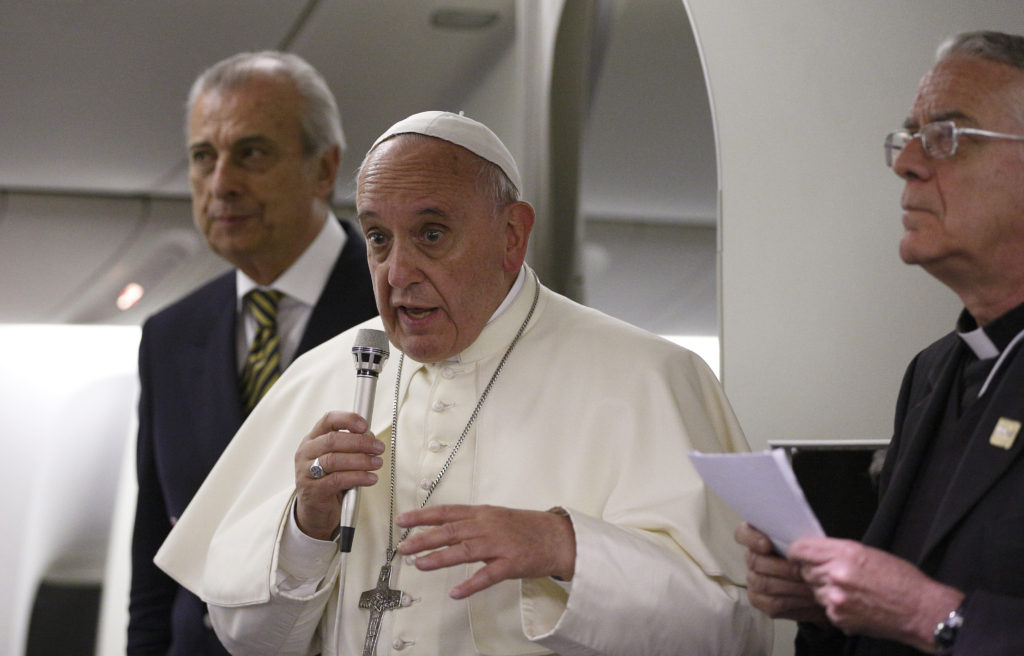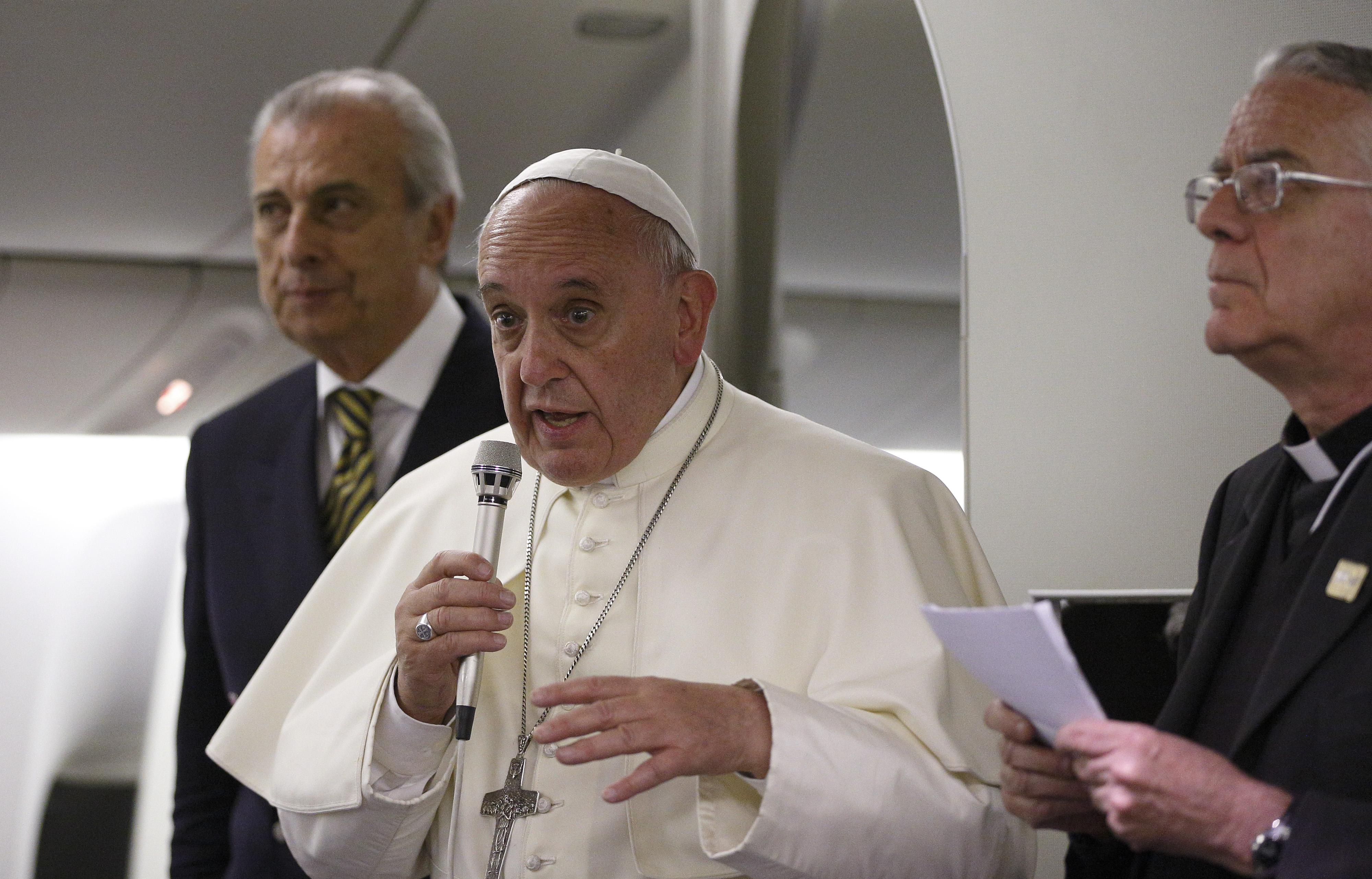
ABOARD THE PAPAL FLIGHT FROM TEL AVIV (CNS) — Pope Francis will meet with a group of sex abuse victims for the first time in June, he told reporters May 26.
During a wide-ranging inflight news conference on his return to Rome from the Holy Land, the pope also confirmed reports the Vatican is investigating charges its former secretary of state misappropriated 15 million euro from the Vatican bank. And he announced he plans to visit the Philippines and Sri Lanka in January.
The pope described the abuse of children by priests as “such an ugly crime” and a “very grave problem,” the betrayal of a priest’s duty to lead young people to holiness, comparable to performance of a Black Mass.
“We must move ahead, ahead, zero tolerance,” he said.
As an indication of how seriously he takes the problem, the pope said he would meet soon with a group of six to eight sex abuse victims from various countries, including Germany, the U.K. and Ireland. He also will celebrate a private Mass with the group in the Vatican guesthouse, where he lives. Cardinal Sean P. O’Malley of Boston, a member of the recently established Vatican commission on child protection, will be present at the gathering, the pope said.
The Vatican spokesman, Jesuit Father Federico Lombardi, told reporters the next day that the exact date for the meeting had not been set but that it would be soon.
Pope Francis is not known ever to have met with a group of sex abuse victims, something Pope Benedict did several times in various countries. Marie Collins, a sex abuse survivor from Ireland whom the pope named to the child protection commission, met him at the Vatican in May.
Pope Francis said the church cannot have privileged “daddy’s boys,” exempt from punishment when it comes to sex abuse of minors. He revealed that three unnamed bishops are currently under investigation by the Vatican for misdeeds related to sex abuse, and another has been found guilty and is awaiting punishment. It was not clear if the bishops in question had been accused of personally abusing children or of mishandling accusations of abuse by priests.
The pope also was asked about reports that Cardinal Tarcisio Bertone, who as Vatican secretary of state was considered the highest Vatican official, mishandled 15 million euro in funds held by the Institute for the Works of Religion, commonly known as the Vatican bank.
“It’s something being studied, it’s not clear,” the pope said. “Maybe it’s the truth, but at this moment it’s not definitive.”
Pope Francis said the Vatican bank was a case study of financial reforms now underway in the Vatican under the new Secretariat for the Economy led by Cardinal George Pell. The bank has closed some 1,600 accounts held by “persons who didn’t have the right,” because they were not church officials or institutions, the pope said.
“But there will still be incongruities, there always will be, because we’re human,” he said. “The reform must be continual.”
The pope answered several questions about his just-ended three-day visit to the Holy Land.
Looking ahead to other travels, Pope Francis said his second trip to Asia, after a visit to Korea in August, will take him to Sri Lanka for two days in January and then to the Philippines, where he will visit areas struck by Typhoon Haiyan last November.
Asked if he might follow his predecessor’s lead and ever resign, Pope Francis said he would pray for the wisdom to obey God’s will, but added that Pope Benedict had “opened a door” to the possibility of other retired popes and would not remain a “unique case.”
Pope Francis said the door is also open to allowing more married priests in the Catholic Church, in the Latin rite as well as the Eastern Catholic churches where the practice is already established.
“Celibacy is not a dogma of faith, it is a rule of life that I appreciate very much and believe to be a gift for the church,” the pope said. “Not being a dogma of faith, the door is always open.”
Discussing what he has frequently called a “throwaway culture,” the product of a “worldwide economic system centered on money, not the human person,” the pope said that culture is exemplified not only by youth unemployment and neglect of the elderly, problems he has cited before, but also by low fertility rates in Europe, particularly in Italy and Spain.
Regarding the two Synods of Bishops on the family he has called for this October and October 2015, the pope lamented what he characterized as an overemphasis, by members of the clergy among others, on the question of when divorced and civilly remarried Catholics may receive Communion.
The pope said focusing on that question posed the risk of “casuistry,” which he has defined in the past as the practice of setting general laws on the basis of exceptional cases. He emphasized the synods would consider the pastoral care of the family in its totality.
“Today, we know, the family is in crisis, it’s a worldwide crisis, the young don’t want to marry or they live together,” Pope Francis said. “The pastoral problem of the family is very large, very large.”
— By Francis X. Rocca, Catholic News Service






